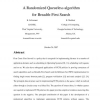4719 search results - page 841 / 944 » Newtonian program analysis |
CN
2007
14 years 11 months ago
2007
Worms are self-replicating malicious programs that represent a major security threat for the Internet, as they can infect and damage a large number of vulnerable hosts at timescal...
ISCA
2008
IEEE
14 years 11 months ago
2008
IEEE
First Come First Served is a policy that is accepted for implementing fairness in a number of application domains such as scheduling in Operating Systems [28, 11], scheduling web ...
IJHPCN
2006
14 years 11 months ago
2006
Abstract-- The performance of collective communication operations is known to have a significant impact on the scalability of some applications. Indeed, the global, synchronous nat...
CONCURRENCY
2007
14 years 11 months ago
2007
OpenMP has gained wide popularity as an API for parallel programming on shared memory and distributed shared memory platforms. Despite its broad availability, there remains a need ...
CORR
2007
Springer
14 years 11 months ago
2007
Springer
— Belief Propagation (BP) and Linear Programming (LP) decodings of Low Density Parity Check (LDPC) codes are discussed. We summarize results of instanton/pseudo-codeword approach...

